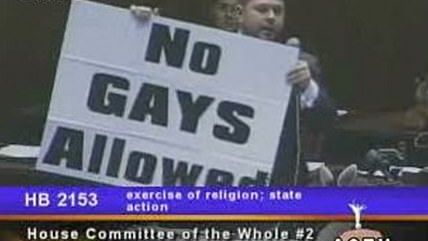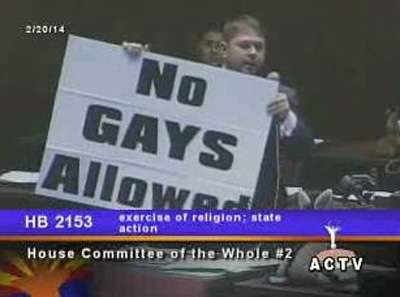News Flash: It's Already Legal to Deny Service to Gays in Arizona
Current fight a consequence of people on both sides using law as a blunt weapon


So Senate Bill 1062 in Arizona is a bit of a stupid piece of nonsense, let's get that out of the way first of all. This "freedom of religion" legislation, passed by the state's legislature yesterday, is getting significant attention by people who think the law gives Arizona businesses the right to discriminate against gays.
Actually, Arizona's laws already give businesses the right to discriminate against gays. Sexual orientation is not included in Arizona's public accommodation laws. Discrimination against gays is actually legal in a lot of places in America still. What Senate Bill 1062 does is essentially tweak the state's existing freedom of religion laws to say that, no really, people in Arizona have the right to the free exercise of religion. You can read the bill here and see what is being changed in blue text. It's not very much.
Note that the law does actually allow for the state to outlaw religious-based discrimination as long as the state proves it is advancing a compelling government interest and that it's the least restrictive way of achieving that interest, so anybody arguing that bigoted firefighters will be allowed to leave gay folks to burn in their homes is full of crap (yes, that argument has bounced around as these types of bills have popped up in various red states).
So what the hell is going on here and why is there so much screaming? These laws are being ginned up in response to the current conflict over whether folks like bakers and photographers have the right to refuse to provide their services for gay weddings. So as those who support using the public accommodation laws to declare that wedding cakes and photographs are civil liberties push, religious conservatives are now trying to use the law to push back.
And so here we have two sides fighting to control laws to control things that shouldn't be controlled by laws. It should be seen as particularly telling that folks in Arizona screaming about this law don't seem to realize that it's already legal to discriminate against gays there. That's a sign this form of bigotry is perhaps not particularly widespread and becoming less and less of an issue as society has less and less of an issue with gay people. Gay people are not starving and freezing to death on the streets because nobody will sell them food or rent them shelter. There are, obviously, pockets of bigoted behavior against gay people, and we know about it because those who engage in it get lots of negative feedback when the media and the public catch wind of it.
People have the right to determine with whom they wish to do business. Occasional misbegotten bigotry is the price of living in a free society. Being an asshole is a right, while having somebody bake you a wedding cake isn't. It's sad in a way, because we'd all rather have wedding cakes than assholes, but we can't guarantee anything without freedom first. We have plenty of tools outside the force of the state to respond to bigotry. We have protests, and the media, and online reviews, and social platforms, and competition, and so many more ways to respond to bigotry than we did back in the days of segregation. The law should be reserved for prohibiting the state itself from engaging in bigotry (the "compelling government interest" exception). Once we remove the state's role in enforcing bigoted laws (like bans on gay marriage recognition) it's our responsibility to handle social discrimination through social channels, not through terrible blunt instrument of the legal code.
Update: Some Reason commenters argue I'm unfairly maligning the capacity of this law to expand freedom. A couple of little changes in the law may have bigger significance. It clarifies a whole list of organizations and private entities that can claim protection of religious expression, such as corporations, and would allow for defendants to invoke the law against private civil lawsuits, not just government actions.


Show Comments (306)